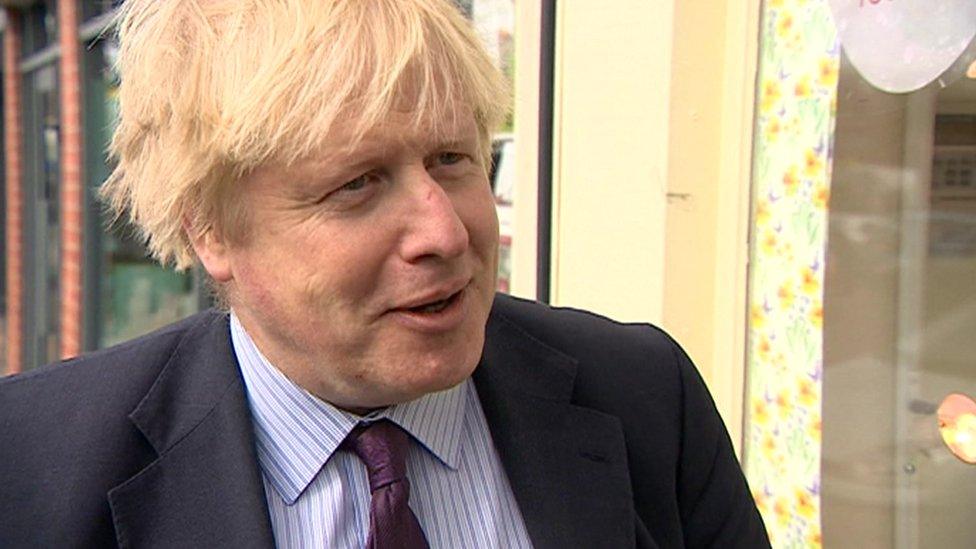Boris Johnson World Cup Nazi comments 'irresponsible'
- Published
Russian ambassador Alexander Yakovenko: Johnson's comments "totally irresponsible"
UK Foreign Secretary Boris Johnson's likening of Russia's World Cup to Hitler's 1936 Berlin Olympics has been branded "totally irresponsible" by the Russian ambassador in London.
Alexander Yakovenko said "nobody had the right" to compare Russia - which lost 25 million lives in World War Two - with Nazi Germany.
He said it was an insult to British war veterans from the Arctic convoys.
Mr Johnson told the BBC: "I stick by, completely, what I said."
Prime Minister Theresa May has said the material used in the attack had been identified as being part of a group of nerve agents developed by Russia, known as Novichok.
She will later tell an EU summit the poisoning of Sergei Skripal and his daughter Yulia shows Moscow has no respect for international law.
The pair remain in a critical condition in hospital after they were found unconscious on a bench on 4 March.
Russia says the UK had "no proof" it carried out the attack.
Mr Johnson made his initial comment at a Foreign Affairs Select Committee meeting on Wednesday.
The foreign secretary agreed with the comparison made by Labour MP Ian Austin, adding: "Your characterisation of what is going to happen in Moscow in the World Cup, in all the venues, yes, I think the comparison with 1936 is certainly right.
"I think it is an emetic prospect frankly to think of [Russian President Vladimir] Putin glorying in this sporting event."
'Beyond common sense'
Speaking at the Russian Embassy in London on Thursday Mr Yakovenko said Moscow considered the foreign secretary's comments "unacceptable and totally irresponsible".
"The British government is free to make a decision about its participation in the World Cup," he said.
"But nobody has the right to insult the Russian people - who defeated Nazism and lost most than 25 million people - by comparing our country to Nazi Germany.
"That goes beyond common sense. And we do not think British war veterans - including those of the Arctic convoys [which shipped four million tonnes of armaments and essential supplies to the Soviet Union during World War Two] - would share this opinion."
The Soviet Union's war dead included Ukrainians, Belarusians, Kazakhs and citizens of other non-Russian Federation countries.

Mr Johnson has stuck by his comments made at the select committee on Wednesday
Speaking later, on a visit to Derby, Mr Johnson said he stuck by what he said "completely".
He said: "We don't want to escalate this any further. What we want is some way in which they will at least accept that the Russian state must have had some role in this.
"We want to see the safety of UK people going to the World Cup, that's the most important thing, [but] I think that the idea of Vladimir Putin glorying in a great sporting occasion and receiving the adulation of international figures is, as I said, emetic.
"So I stick by completely what I said."
'Refuses to co-operate'
Mr Yakovenko's response came as he gave a statement on Russia's latest position regarding the Salisbury attack.
He criticised the British government for refusing to share information and provide the Russian government with a sample of the nerve agent.
He said Mrs May had "built the official position on assumptions", adding: "Britain has, without any evidence, blamed Russia of poisoning of three people [the Skripals and Det Sgt Nick Bailey who was part of the initial response to the incident] and continues to refuse to cooperate.
"We cannot accept that."
But Mrs May will stick with her conclusion and tell EU heads of state that although the attempted assassination of the Skripals took place on UK soil, the Russian threat does not respect borders and places all European nations at risk.